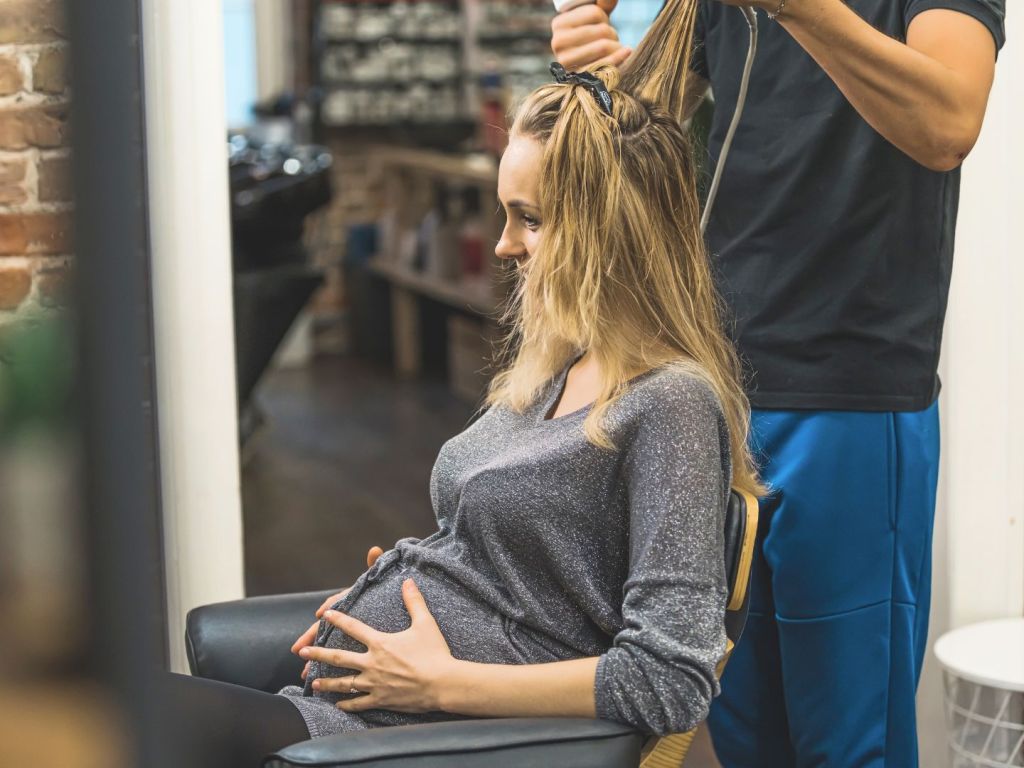Dying Your Hair While Pregnant: Is It Safe?

[ad_1]
As soon as you find out you’re having a baby, pregnancy books and obstetricians will give you lists of things to avoid. Think: contact sports, chemical sunscreens, store-bought sushi. But what about dying your hair while pregnant? Can you keep up your highlighting habit even when you’re expecting?
Unfortunately, the answer isn’t exactly, well, cut and dry. “There’s not a lot of data,” Dr. Catherine Caponero, DO, an obstetrician and gynecologist with Cleveland Clinic, tells SheKnows. That’s because you won’t see a lot of pregnant people signing up for a study that could potentially harm their baby. “However, the limited data we have [from] animal trials do show that it is relatively safe to dye hair during pregnancy,” Caponero says. While scientists don’t know the exact risks in humans, experts will tell you it’s okay to dye your hair with a little one growing in your belly.
How to dye your hair as safely as possible during pregnancy
Whether you’re heading to the salon or doing a DIY dye job at home, there are some steps you can take to decrease any potential risks of dying your hair while pregnant.
Wait until the second trimester (or later)
To be extra safe, Caponero recommends waiting until week 13 or later — aka the second or third trimester — to dye your hair. “In general with pregnancy, avoiding things in the first trimester when all of the baby’s organs are being developed is ideal,” she says.
Minimize fumes
Make sure the salon is well-ventilated, or try to head outside if you’re dying your hair at home. A pregnant nose can be highly sensitive to smells, and strong fumes can make you feel nauseated or cause headaches. “It’s also the question of, what are the effects of these hormone disruptors that we just don’t know enough about?” Caponero says.
Wear gloves if you’re dying your own hair
Try to limit how much dye touches your skin. Caponero points out that one recent study linked long-term use of chemical hair relaxers to uterine cancer. “Similar studies are being evaluated in regards to, Are these chemicals causing hormone disruptions? And if that’s the case, could that impact the baby?” she says. Until we have those answers or know the impact of hair dye in particular, it’s best to keep these chemicals off your skin by wearing gloves, especially when you’re pregnant.
Consider the type of dye
If you’re concerned about the carcinogenic risks of dyes, Caponero says temporary dyes are a little bit safer to use. “The ones that are ammonia-free, paraben-free, or peroxide-free can be helpful as well to reduce your risk of exposing the baby to other complications or problems,” she says.
Use the minimum amount of dye
If you’re doing your hair at home, most packages will come with instructions that recommend a range of time to leave the dye in. Caponero says that when you’re pregnant, you should stick with the bottom end of that suggestion. “We encourage people to use the lowest dose possible so that we’re minimizing the amount of risk to the baby,” she says.
Maybe skip the dye if your skin might have microtears
If you have eczema, psoriasis, or another skin condition that causes microtears in the skin, Caponero says you might want to wait until after delivery just to keep your baby as safe as possible. “There aren’t really great studies on what complications or problems could occur,” she says. But you’ll bypass any potential risk by skipping dyes altogether.
Dying your hair while breastfeeding: Is it safe?
Once you’ve delivered your little one, you might be eager to cover up those roots if you have avoided dyes for the past nine months. While there isn’t any research on hair dye while breastfeeding either, Caponero says that theoretically it should be safer than during pregnancy. “When you’re pregnant, you’re sharing a blood supply with the baby, so everything that goes into your blood is also going into the baby’s blood,” she says. “When you’re breastfeeding, everything is getting diluted because it has to go through your bloodstream to then get to your breast milk.” Just try to keep baby away from any fumes if you can.
Before you go, check out these bed-rest essentials for pregnancy:
[ad_2]






